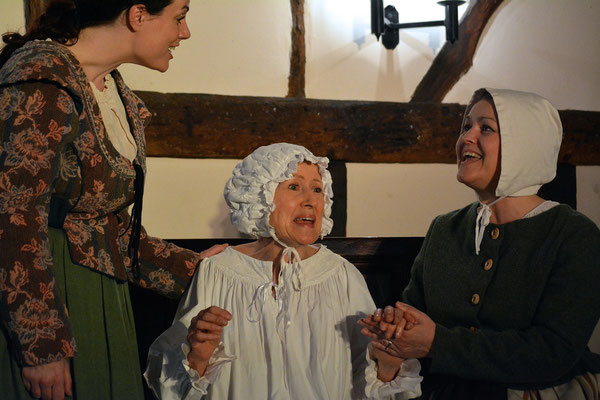Synopsis

It has generally been believed that Shakespeare cared little for his wife which was endorsed by his strange bequest to her as his final legacy. This delightful piece of theatre makes one reconsider.
The play opens three weeks after Shakespeare’s death in 1616, with the unexpected arrival of Curate Dunstan at the home of Shakespeare’s eldest daughter Susanna Hall and her husband. They now reside in the family home in Stratford upon Avon, where Susanna cares for her mother, Anne Hathaway. The Curate has come to read the will to the family, which in Shakespeare’s day was the business of the church rather than the legal profession. He makes it clear that he believes the Bard had no affection for his wife, or why else would he have left her and the family to spend most of his life in London, and, then, on his death, leave her nothing but his second best bed.
Susanna surprises him by pointing out that she already knows the contents of her father's will, but is interrupted by Judith, the younger daughter, bursting in full of indignation, thinking that she has been deliberately ostracised from the reading. The sisters don’t always see eye to eye, but they both agree that the curate is mistaken in his opinions regarding their father and they explain to him the circumstances that shaped the way Shakespeare led his life.
Anna Hathaway joins them in a short but important part, and it is clear that the old lady is suffering from dementia, as she keeps wanting to go home “as William might come home and wonder where I am”. With their mother sitting lovingly beside them, the sisters reveal to the Curate the reason behind the seemingly odd bequest of the second best bed. |
- Susanna Hall - 34, Shakespeare’s elder daughter, a middle-aged housewife
- Curate - 25-35, a self-righteous church official, has a clerical/legal mind with a modern outlook
- Judith - 31, Shakespeare’s youngest daughter, somewhat bad tempered
- Anne Hathaway - 60, Shakespeare’s wife, has the early onset of dementia
|
 Loading... Please wait...
Loading... Please wait... Loading... Please wait...
Loading... Please wait...